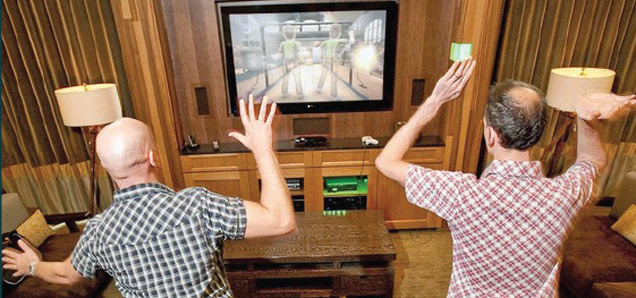Motion-control games: Do gamers really want to get off the couch to play?

Since 1972, when Magnavox released the Odyssey, the very first home video game console, video games have quickly and steadily evolved. From 8-bit animation and sound to 3D platforms to interactive and competitive online gaming, gamers have been experiencing new heights of gameplay with each innovation.
One of the most recent moves by designers was motion-controlled games. The first modern system to come out that used motion controls was the Nintendo Wii, released in 2006. Presently on the market are the Wii, the Kinect for Xbox 360 and PlayStation Move.
Motion-control games sound like a great idea in theory: you can get up off the couch and physically control what the character in the game does with your own body movements.
Some gamers seem thoroughly excited for this development, like Christine Harris, a casual gamer who plays once every couple of weeks. She said she especially enjoys playing games on the Kinect. "It's awesome! I love being so involved. Like in Kinect Sports — to box, you have to really punch!"
Serious gamers seem to have a different opinion on the matter. Joe Huntington is an avid gamer who spends an average of 10 hours per week playing all types of games, from first-person shooters to role-playing games. Huntington got his gaming start early in life. "I got a (Nintendo) Game Boy from my parents when I was probably six or seven," he explained. "I took it everywhere with me, from friend's houses to family events. But they never let me have a real console. They thought I would spend too much time just sitting in front of the TV playing games."
After working odd jobs for an entire summer and saving every penny, Huntington finally took matters into his own hands, buying a friend's old Nintendo 64. Just as his parents had feared, "I spent hours sitting in front of the TV playing Perfect Dark," Huntington confessed. "My gaming kind of just kept going from that point on. I bought myself a PlayStation 2 and an Xbox. Now I have all the new systems (Xbox 360, Nintendo Wii, PlayStation 3) and I collect vintage systems and games."
Huntington said he is unsure how he feels about new motion control games. "I believe that it could go in a good direction, but it could also go in a really bad direction," he explained. "When you think back to like, a (Nintendo) Virtual Boy or the Nintendo Power Glove, they seem really gimmicky. The big thing today is trying to turn that gimmicky product into something that people absolutely need."
Going overboard with motion control would definitely hinder the gaming experience, said Huntington. "It has to be done delicately to be done well. Too much motion control will take away from the experience. There are subtle things, like if I'm playing Wii, Kinect or Move, and all it's having you do is run on the spot, that's really good. With motion control, I find that if it's getting you to try to do too many things with the motion, it takes away from the enjoyment of the game."
There are some games that look as though they'll be achieving the right balance for motion control, such as Microsoft's implementation of Kinect into their new racing game, Forza Motorsport 4, said Huntington. "It's integrated in a way that enhances the experience instead of trying to redefine the whole game." He explained that the game uses an innovative technology called head tracking. "While you're still playing with a regular controller, if you turn your head to the left or right, the driver's head on the screen and your view of the game pans in that direction."
Another devoted gamer, Pat Vis, holds a similar viewpoint. "I don't really care for motion controls, as most of the games that use them aren't made for the core gamer," he explained. "However, I think they are a great way for kids and families to play games and to get into gaming."
In essence, what Huntington wants from a motion-control game is simplicity. "Less is definitely more," he expressed. So it would seem that the more serious the gamer, the less interest there is in motion controls, but even the most enthusiastic gamers can't turn down every gimmick. "I will say that I'm very excited for the Star Wars game for Kinect. I want to be able to hold my hand up to the screen and use The Force," Huntington confessed.
There appears to be a great divide between those who are eager for motion-controlled games, and those who are wary of the change in gameplay. Gamers hope that game designers will be able to strike a balance and give all gamers exactly the new experience they are looking for.













